‘When we plant trees, we plant the seeds of peace and seeds of hope’
Wangari Maathai, first African woman to win the Nobel Peace Prize
Palestine is a land rich in fruit trees. It is best known for its native olive trees which are especially resilient to the harsh conditions, thriving on minimal water, which is restricted for Palestinians by the Israeli authorities. You can also find fruits such as figs, watermelons, apricots and avocados growing in Palestine. It is currently citrus season and citrus trees are rich with kumquats, oranges and ‘sweet limes’.
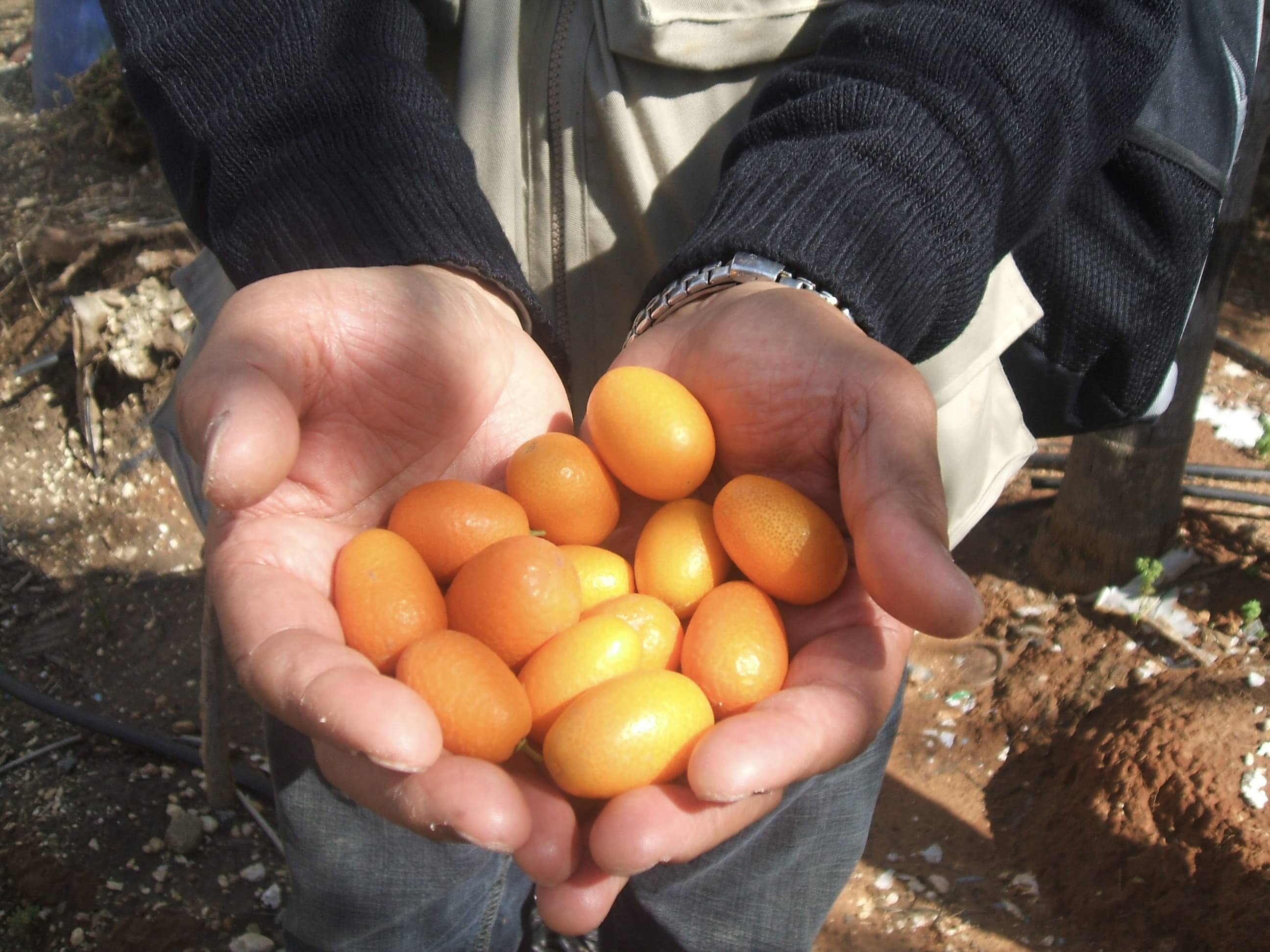
Freshly picked kumquats, Bethlehem
In the wake of the Gaza war, the West Bank has been placed under strict military lockdown and settler violence against Palestinians has escalated. These conditions have heightened pre-existing Israeli restrictions on Palestinians right to access their trees. In last autumns olive season, 75% of olives in some areas went unharvested. Around 100,000 Palestinian families rely on olive trees as a source of income.
When I applied to be a human rights monitor, I never envisaged that the role would entail the protection of trees. Why do trees need protecting? Locals tell us that trees represent a rooted connection to a land and the intention of a long-term presence to see a tree mature. They say that some Israeli soldiers and settlers find it necessary prevent these connections being established and use the destruction of fruit trees to deprive Palestinians of their livelihoods.
My first exposure to this was in the village of Khallet Athaba, a small community in Masafer Yatta, south of Hebron. The 1,200 residents of Masafer Yatta are under threat of mass displacement, following the state of Israel’s categorisation of the area as a closed military zone, ‘Firing Zone 918’. The communities have battled their way through Israel’s military court system to have the designation overturned but have been unsuccessful. The future of these communities is now threatened by the ongoing presence of Israeli soldiers and settlers, and the destruction of Palestinian property and other means to life.
As we approached the village, we witnessed a beautiful sunset and colourful graffiti produced by previous international visitors who had sought to protect the village with their presence. The Palestinian landowner had expressed to us his devastation at receiving a demolition order for 50 of his trees. A month later, we witnessed the Israeli military arrive in bulldozers to complete the order. It felt as though something sacred had been desecrated. The severing of the roots of a living object is hard to justify where the soil is good and able to support its life.
‘Masafer Yatta is like my mother and has helped me to grow and learn. The Israeli state tries to cut us down but our roots are too deep.’
Abu Ayham, Masafer Yatta
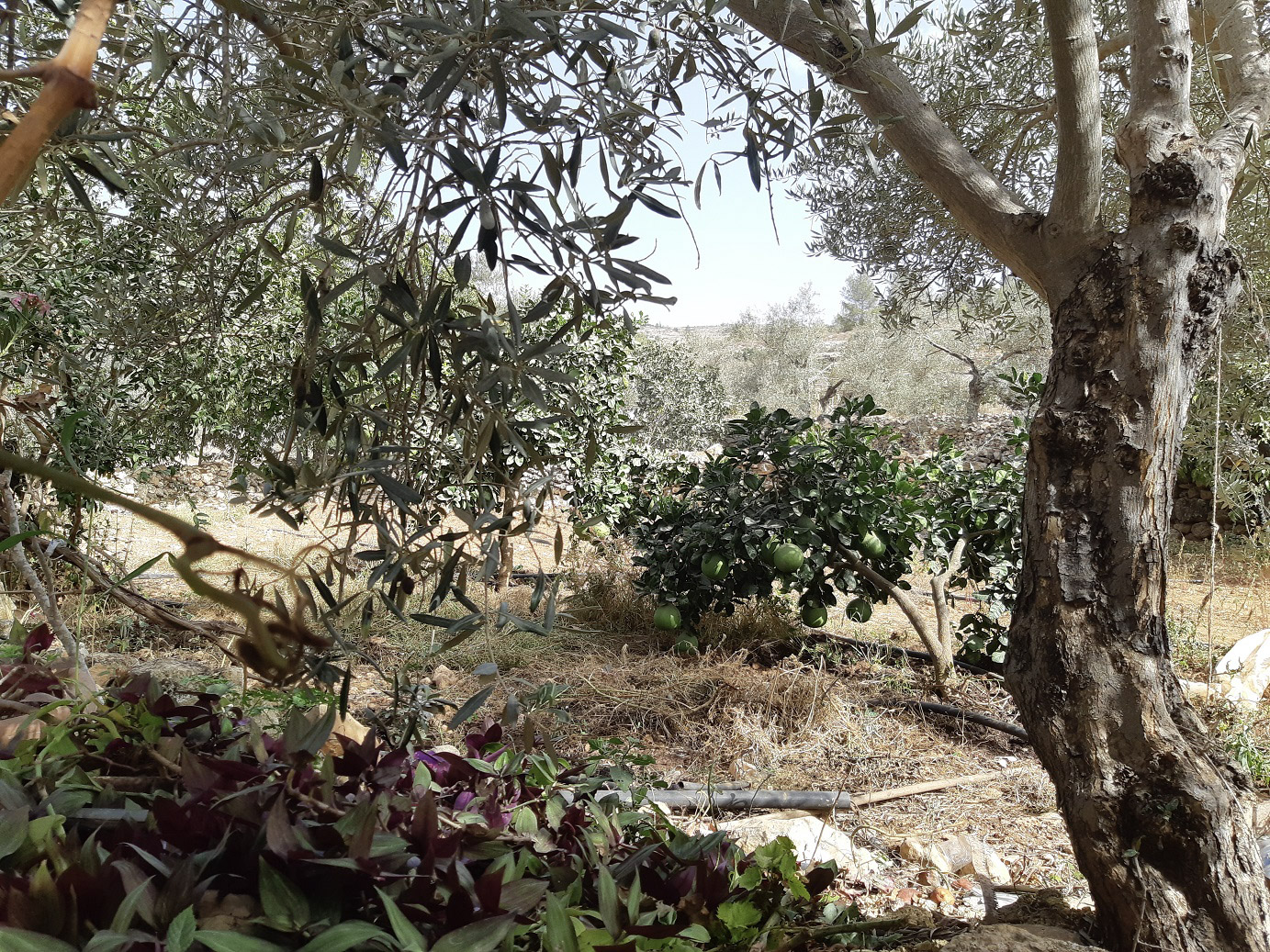
Trees at Umm Nasser’s , Ramallah
On Christmas Eve, settlers set up a caravan and some tents within the UNESCO World Heritage Site of Battir on the outskirts of Bethlehem. Israeli soldiers encircled the area, closed off all entrances and have since prevented the Palestinian owners from reaching their land. Mohammed from the Battir council tells us that the settler outpost has been expanding day-by-day under the protection of the military and in early February, bulldozers arrived to demolish the Palestinian olive tree groves surrounding the settlement. A petition to protect the lands of Battir reads;
‘Battir is known for its ancient terraces and irrigation system which date back 5000 years. The local community have preserved traditional farming practices and ensured the sustainable management of the natural water springs, essential to life in this area. The site’s unique biodiversity includes many endangered species and it serves as a green lung for the local community. The illegal settlement outpost poses an imminent threat to these irreplaceable treasures.‘
Not all trees are subject to demolition orders. Often trees are demolished by the settlers without any warning. This was the case in Wedadie, a hamlet close to the southern Israeli border. Mahmoud, a recently retired teacher planted 80 olive tree seedlings only to find them destroyed overnight by settlers from an illegal outpost that had recently been set up on the hilltop close to his land. His neighbours 200 olive seedlings were destroyed by sheep that the settlers allowed to enter his land at the same time. Mahmoud said;
‘They took my land in 1947 and now taken my olives. Except for our God, no one helps us. The police and settlers are one, they are the same.’
Last autumns olive harvest was especially difficult and many Palestinian farmers were denied access to their land. Having waited all year for the olives, locals in the area expressed their fear and disappointment, especially given the harsh economic conditions of the West Bank since the start of the war. One mother from Yatta explained that it is not only that you are not allowed to harvest the olives but;
‘you stay worried, you fear that at any moment they [settlers] will take your land, not just your olives. Fear comes from having a family, having children, being frightened that settlers will demolish his house, take his land, kill him and the family need these things.’
As well as stopping farmers harvesting their fruits, we also witnessed the military prevent them from ploughing their land. Greenhouses have been destroyed, donkeys and tractors confiscated and boulders placed on farming tracks to block access. Meanwhile, the fertile land available to Palestinians is diminishing as settlements expand across the landscape and settler flocks overpopulate the grazing space.
The impact of the military occupation of Palestine adds pressure to land that is already especially vulnerable to the impacts of climate change. Palestinians do not control resources such as water, land access or ownership of agricultural machinery. Military laws govern the use and ownership of water and restrict Palestinian rural communities from installing water butts on their roofs, digging new wells or building under water cisterns. Israel controls the underwater aquifers in the West Bank. Whilst settlements benefit from reservoirs and connections to a mains supply from the aquifers, most rural Palestinian communities are denied access.
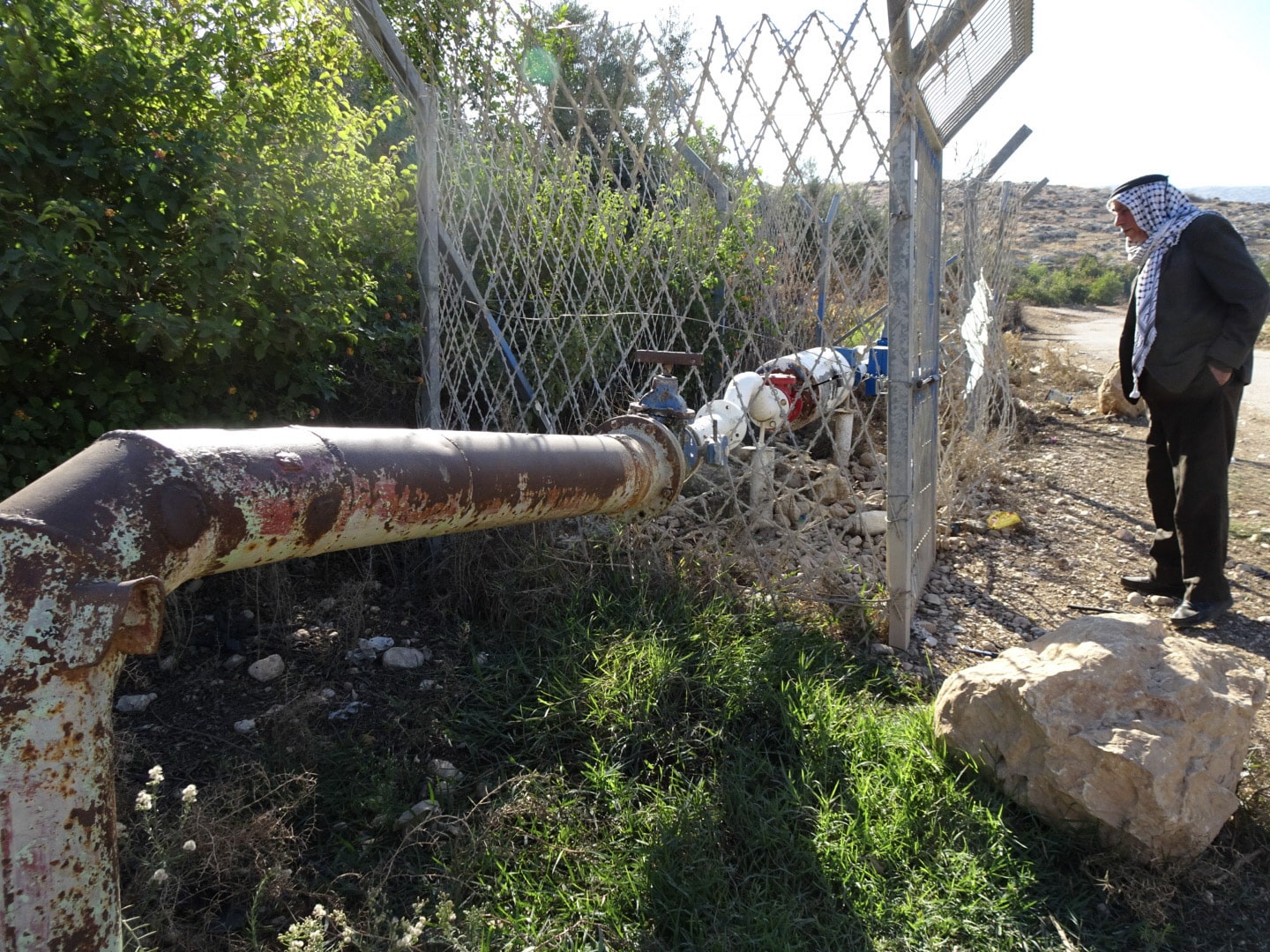
Water pipes in the Palestinian village of Baddala Village, Jordan Valley for nearby Israeli settlements. Closed for Palestinians.
Open sewers carry wastewater from the settlements through a number of rural Palestinian communities into Israel, where it is treated. Israel’s building restrictions prohibit Palestinians from building treatment facilities in the West Bank or infrastructure which would enable the water to be carried underground. According to the Applied Research Institute in Jerusalem, this has a ‘devastating effects on Palestinian lands’ often rendering them unsafe for agriculture and infecting the natural sources of drinking water they rely on.
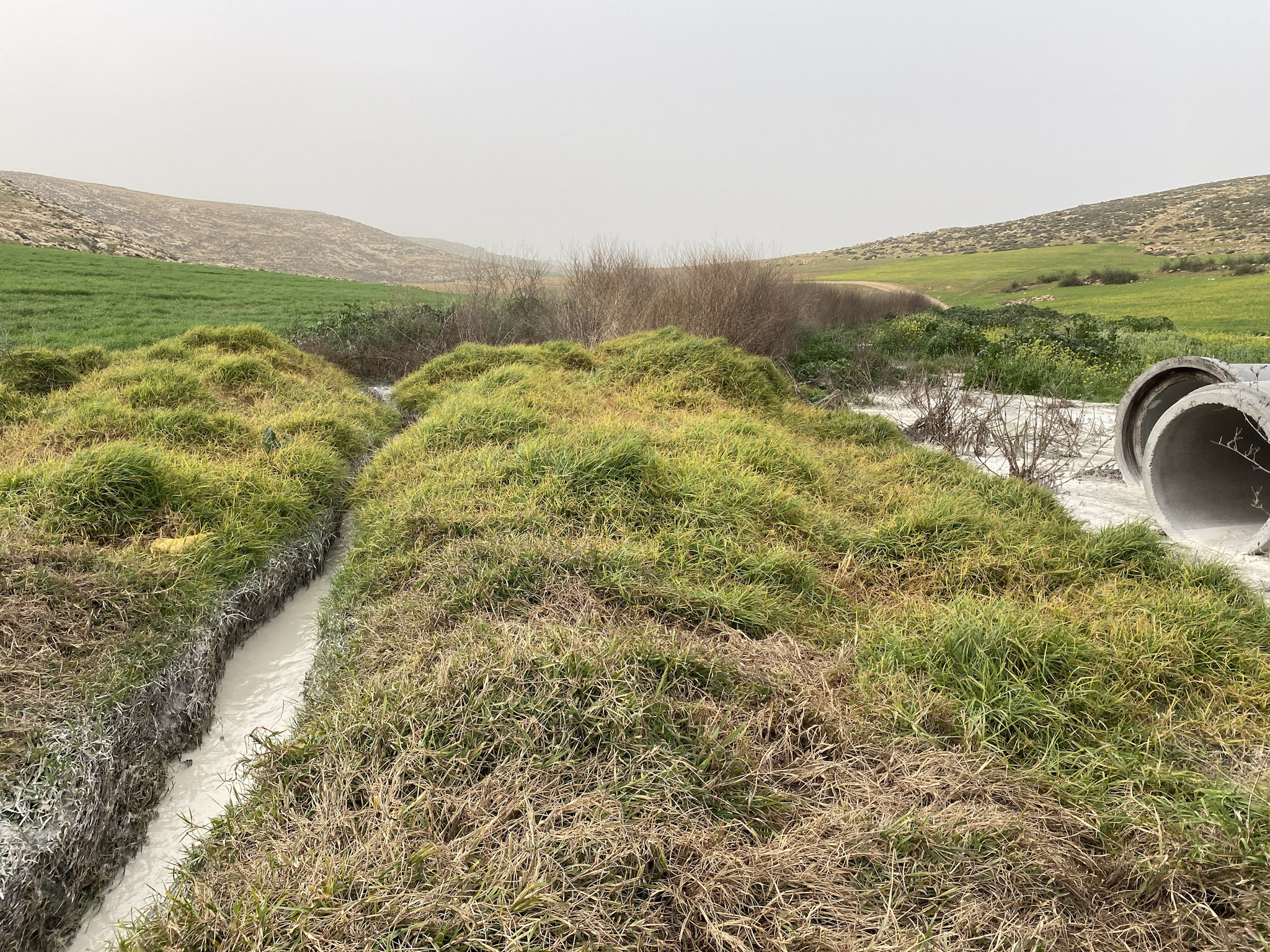
Open sewers running from an Israeli settlement through the Palestinian village of Khirbet Shuweika
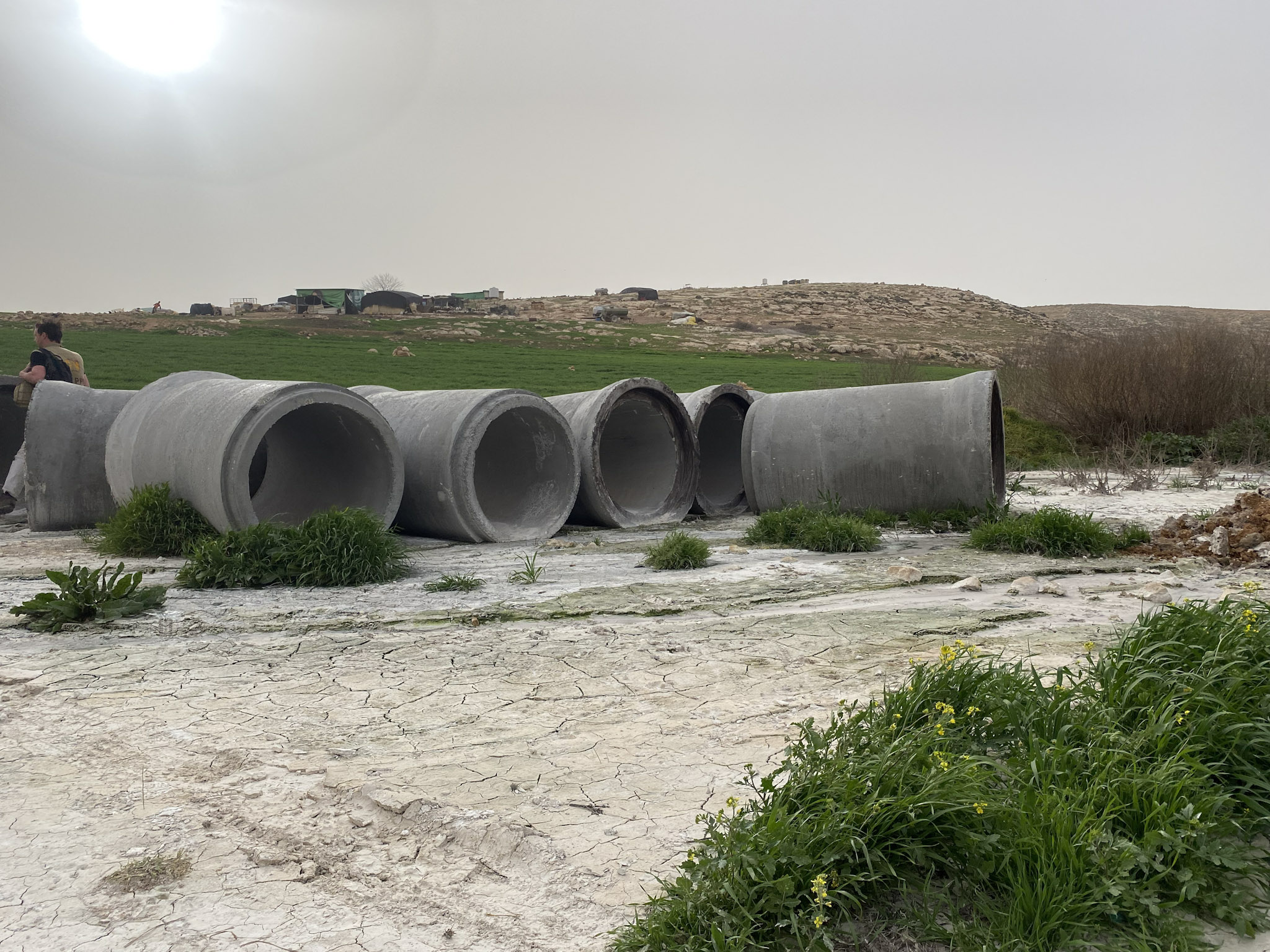
Pipes which Palestinians have been prohibited from installing
Israel launched its military attack on Gaza in response to the 7 October attacks by Hamas which killed more than 1,100 Israelis and captured 240 – with over 100 still being held hostage. The International Court of Justice recently ruled that Israel’s military response could constitute genocide. At the time of writing over 29,000 Palestinians have now been killed, mostly women and children. A further 1.9 million Gazans, nearly 85% of the population, have been internally displaced, while more than 90% face acute food insecurity.
With the worlds attention understandably focused on Gaza, the West Bank has witnessed a surge of violent military and settler attacks on Palestinian land. 382 Palestinians have been killed and 16-rural Palestinian communities forced from their land by settlers in what the UN has called ‘the other mass displacement’. There has also been a surge in the establishment of settler outposts.
Organisations such as Rabbi’s for Human Rights regularly stand in solidarity with Palestinian rural communities as they harvest their trees, and against the backdrop of escalating violence, recently began their annual tree-planting project, ‘Planting Justice‘ in the occupied West Bank;
‘The Tree, for which the land is toiled, which we plant every year on Tu B’Shevat and whose fruits we harvest has come to symbolize a connection to the land and to the divine. These same trees are routinely torched by settlers seeking to demonstrate that they are the masters of the land and that they are in control. On the other hand when Palestinians and Israelis come together to plant trees a message of belonging, solidarity and hope for a common future is voiced. This is the message of the olive branch and it is our message with every tree planted.’
Take action!
-
Sign this petition and urge UNESCO to intervene in protecting the World Heritage Site of Battir from settler outposts.
-
The Israeli military is expanding its invasion into Rafah, a supposed ‘safe zone’ in southern Gaza where 1.3 million Palestinians are sheltering. The humanitarian consequences will be catastrophic. In the UK? Please sign our urgent MP email here.
-
Support the work of Rabbis for Human Rights and their tree planting project in Palestine.

